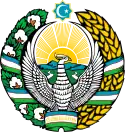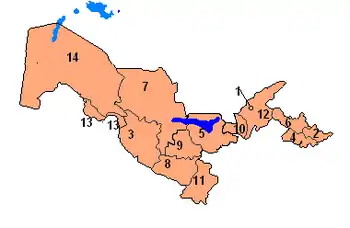Uzbekistan
Uzbekistan is a country in Central Asia. Its capital and largest city is Tashkent. There are about 34,8[5] million people living in Uzbekistan, in 2023. The neighbouring countries are Afghanistan, Kazakhstan, Kyrgyzstan, Tajikistan and Turkmenistan. It is a doubly landlocked country, of which there are only two in the world. Most people in Uzbekistan speak a language called Uzbek, a Turkic language similar to Uyghur and Turkish. In the Uzbek language, Uzbekistan is called "O‘zbekiston" and it means "the land of the true nobles". Uzbekistan has a long history. Humans first lived in Uzbekistan from before the 2nd millennium BC.[6] The current president today is Shavkat Mirziyoyev. The situation with the human rights in Uzbekistan is very bad, according to Human Rights Watch.[7]
Republic of Uzbekistan O‘zbekiston Respublikasi Ўзбекистон Республикаси | |
|---|---|
 Emblem
| |
| Anthem: O‘zbekiston Respublikasining Davlat Madhiyasi | |
.svg.png.webp) | |
| Capital and largest city | Tashkent |
| Official languages | Uzbek |
| Recognised regional languages | Karakalpak |
| Ethnic groups (1996) | |
| Demonym(s) | Uzbek |
| Government | Unitary presidential state |
| Shavkat Mirziyoyev | |
| Abdulla Aripov | |
| Legislature | Supreme Assembly |
| Senate | |
| Legislative Chamber | |
| Independence from the Soviet Union | |
• Formation | 1747b |
| October 27, 1924 | |
• Declared | September 1, 1991 |
• Recognized | December 8, 1991 |
• Completed | December 25, 1991 |
| Area | |
• Total | 447,400 km2 (172,700 sq mi) (56th) |
• Water (%) | 4.9 |
| Population | |
• 2012 estimate | 29,559,100[2] (45th) |
• Density | 61.4/km2 (159.0/sq mi) (136th) |
| GDP (PPP) | 2012 estimate |
• Total | $103.212 billion.[3] |
• Per capita | $3,536.[3] |
| GDP (nominal) | 2012 estimate |
• Total | $51.979 billion[3] |
• Per capita | $1,780[3] |
| Gini (2000) | low · 95th |
| HDI (2010) | medium · 102nd |
| Currency | Uzbekistan so'm (O'zbekiston so'mi) (UZS) |
| Time zone | UTC+5 (UZT) |
| UTC+5 (not observed) | |
| Driving side | right |
| Calling code | +998 |
| ISO 3166 code | UZ |
| Internet TLD | .uz |
| |
Islam is its largest religion.
Provinces
Uzbekistan is divided into twelve provinces, one autonomous republic, and one independent city. The provinces are divided into districts.

| Division | Capital City | Area (km²) | Population (2008)[8] | Key |
|---|---|---|---|---|
| Buxoro Region | Buxoro (Bukhara) | 39,400 | 1,576,800 | 3 |
| Jizzax Region | Jizzax | 20,500 | 1,090,900 | 5 |
| Navoiy Region | Navoiy | 110,800 | 834,100 | 7 |
| Qashqadaryo Region | Qarshi | 28,400 | 2,537,600 | 8 |
| Samarqand Region | Samarkand | 16,400 | 3,032,000 | 9 |
| Sirdaryo Region | Guliston | 5,100 | 698,100 | 10 |
| Surxondaryo Region | Termiz | 20,800 | 2,012,600 | 11 |
| Tashkent Region | Toshkent (Tashkent) | 15,300 | 2,537,500 | 12 |
| Tashkent City | Toshkent (Tashkent) | ??? | 2,192,700 | 1 |
| Fergana Valley Region | ||||
| Fergana Region | Fergana | 6,800 | 2,997,400 | 4 |
| Andijan Region | Andijan | 4,200 | 2,477,900 | 2 |
| Namangan Region | Namangan | 7,900 | 2,196,200 | 6 |
| Karakalpakstan Region | ||||
| Xorazm Region | Urganch | 6,300 | 1,517,600 | 13 |
| Qaraqalpaqstan Respublikasi | Nukus | 160,000 | 1,612,300 | 14 |
References
- "CIA – The World Factbook". Cia.gov. Archived from the original on July 9, 2016. Retrieved January 28, 2011.
- Official population estimation 2012-01-01 Archived 2013-08-09 at the Wayback Machine. Stat.uz (2012-01-23). Retrieved on 2012-03-13.
- МВФ — World Economic Outlook Database, April 2012 — Uzbekistan. Gross domestic product…
- "Human Development Report 2010" (PDF). United Nations. 2010. Archived from the original (PDF) on November 21, 2010. Retrieved November 5, 2010.
- "Uzbekistan Population (2023) - Worldometer". www.worldometers.info. Retrieved 2023-03-02.
- Embassy of Uzbekistan Archived 2008-07-04 at the Wayback Machine - UZBEKISTAN: PAST, PRESENT, FUTURE
- Uzbekistan: Human Rights Watch
- "Statistical Review of Uzbekistan 2008, p.176" (PDF). Archived from the original (PDF) on 2010-11-13. Retrieved May 2, 2010.
Further reading
- Poopak NikTalab. Sarve Samarghand (Cedar of Samarkand), continuous interpretation of Rudaki's poems, Tehran 2020, Faradid Publications {Introduction}
